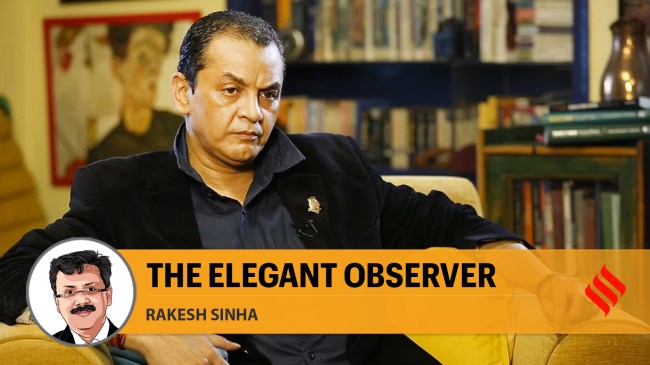Opinion With Sankarshan Thakur’s passing, a quiet elegance in journalism fades
In his words and presence, stories lived gently. Be it Kashmir or Bihar, in the turmoil and politics that he captured so well to tell an India story, his reportage stood out. For the richness of details, the portrayal of characters, the ominous warnings of what could follow
 There are writers and then there are writers. Sankarshan was in the latter category. And with his passing today, a certain elegance is gone.
There are writers and then there are writers. Sankarshan was in the latter category. And with his passing today, a certain elegance is gone. In 2014, on a muggy August afternoon in Kathmandu, we found ourselves in a roadside cafe, staring at pints of Carlsberg on the table. We had been shooed away from the street below where security men were taking no chances to let Narendra Modi’s cavalcade pass, the first Indian Prime Minister to visit Nepal in 17 years.
As we waited, wondering what should be the highlight of the day’s dispatch, Sankarshan Thakur, who had once been a colleague at The Indian Express, asked if I had read Barbara Kingsolver. Only one, The Poisonwood Bible, I said. Demon Copperhead was still eight years away. For a few minutes, we let our thoughts drift to the Price family in faraway Congo, forgetting what we were here for. We need to write, he said. He asked me to look up Kingsolver’s 2008 speech at Duke University. I did, months later. I made a note of thanking him, but never did.
There are writers and then there are writers. Sankarshan was in the latter category. And with his passing today, a certain elegance is gone.
Memory is only a little about memorising, he would say. Writing in The Telegraph, the newspaper he was to edit later, Sankarshan recalled his mother’s memory of his father Janardan Thakur, the author and journalist, who had passed away in 1999. He wrote that he would often see his mother looking at him “almost as if she were looking at someone else and I just happened to be in the way.” He said she told him, “It isn’t you, it’s your father.”
We met again in Kathmandu in 2015 when a devastating quake destroyed large parts of the city and country. He said he had been writing. The Brothers Bihari, where he had put together his earlier works on Lalu Prasad and Nitish Kumar, was due for release ahead of the Bihar Assembly elections that year. That conversation ended quickly. We got back to reporting the dead and the misery and the sorrow of the living. I remember his line about the banks of the Bagmati running out of ground to stack pyres.
Be it Kashmir or Bihar, in the turmoil and politics that he captured so well to tell an India story, his reportage stood out. For the richness of details, the portrayal of characters, the ominous warnings of what could follow. Knowing him, however fleeting our meetings, this was one Bihar election he would have loved to write on. That was not to be.
Being with him was also fun. I recall one episode from that 2014 trip to Kathmandu when Modi travelled to Nepal. Waiting for word on the outcome of the meetings, we stopped an official to inquire what had transpired. He told us to wait for the formal statement. But before he walked away, he said India would be extending an LOC to Nepal.
A young reporter for an Indian TV channel, who seemed to be new to the profession and not prepared for the assignment she had been thrown into, turned to Sankarshan and asked him why India would want to extend the LoC to Nepal. With a straight face, he told her something on these lines: “Terrible, isn’t it? Pakistan would be so upset, and China so angry.” She nodded in agreement. Alarmed that she may air it, I told him, “Stop it. She may put it out.” Sankarshan then broke it to her gently: This LOC is a Line of Credit to Nepal, not the Line of Control with Pakistan.
That episode stayed with us, and he would bring it up each time we met.
Everyone whose lives he touched will miss him, remember him for the warmth he exuded, his gentle gaze, the firmness with which he would call a spade a spade, and the richness of the conversations he would have even with people he didn’t exactly know. And I, for one, will also remember him for introducing me to the world of Kingsolver.



